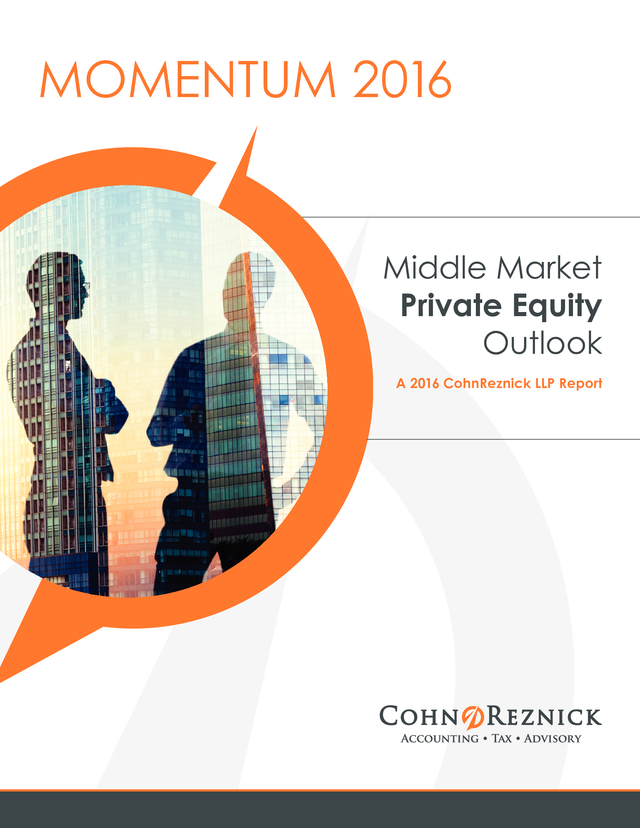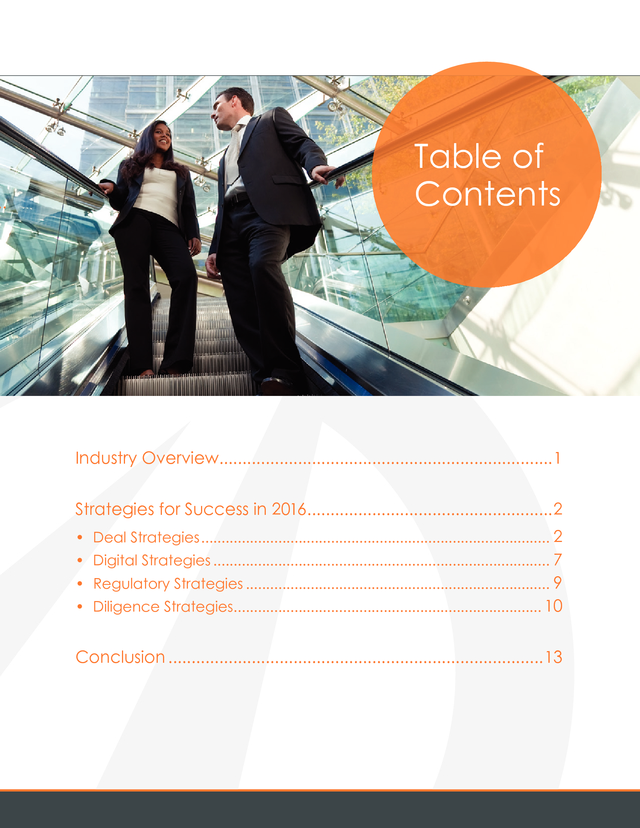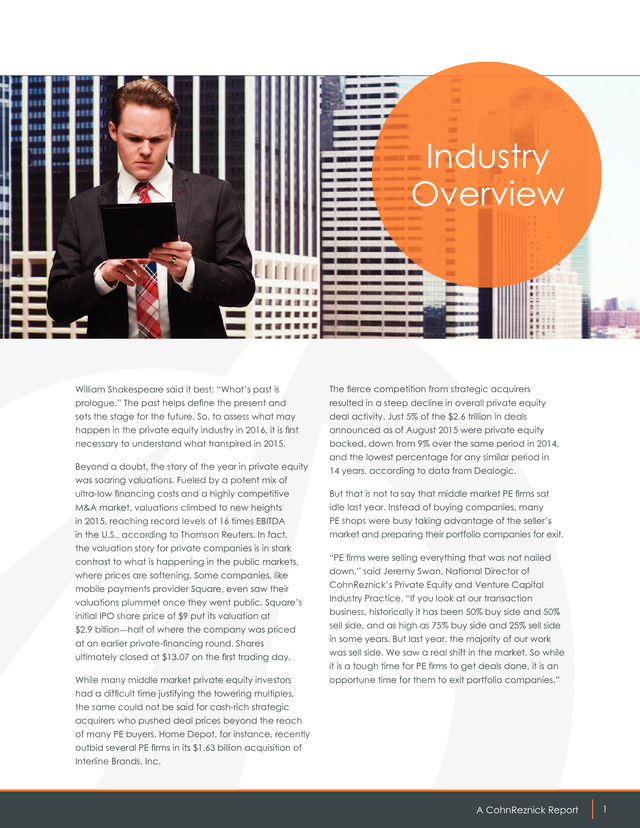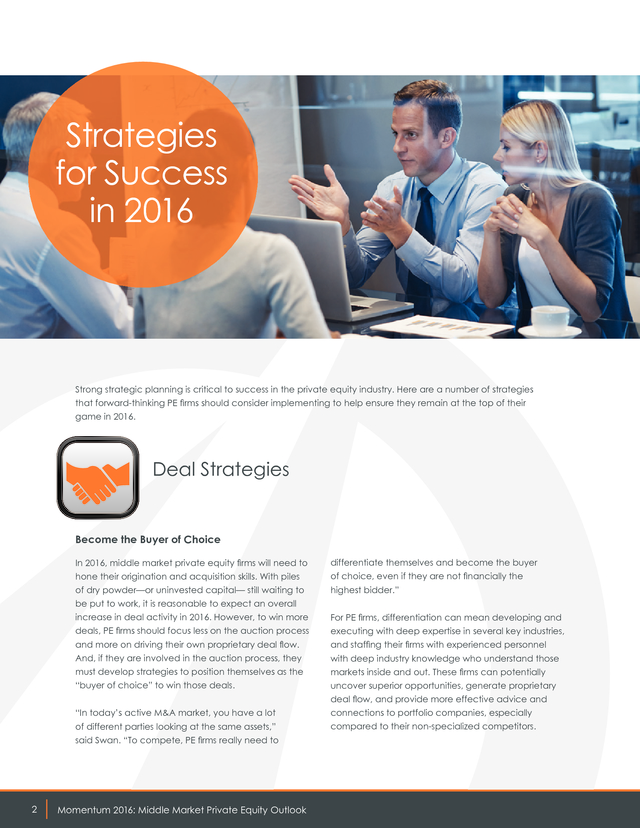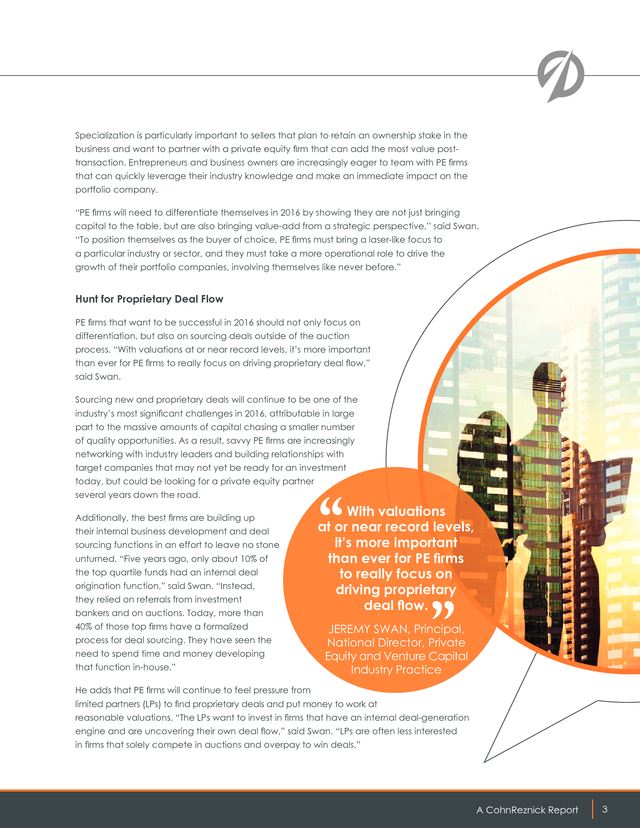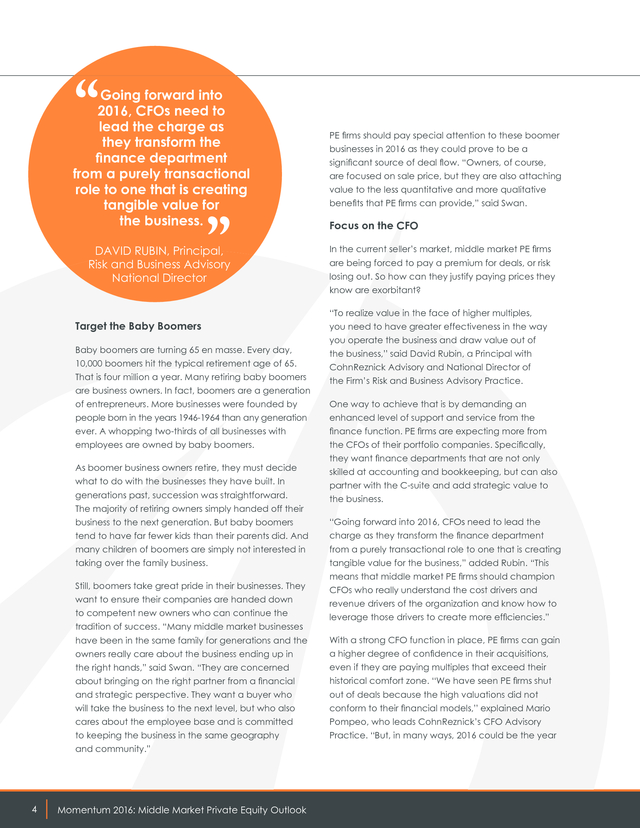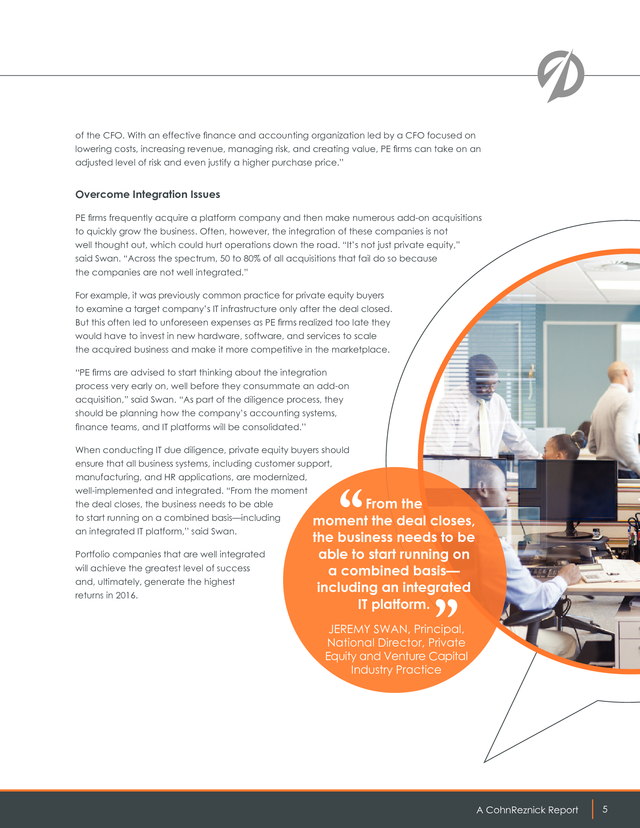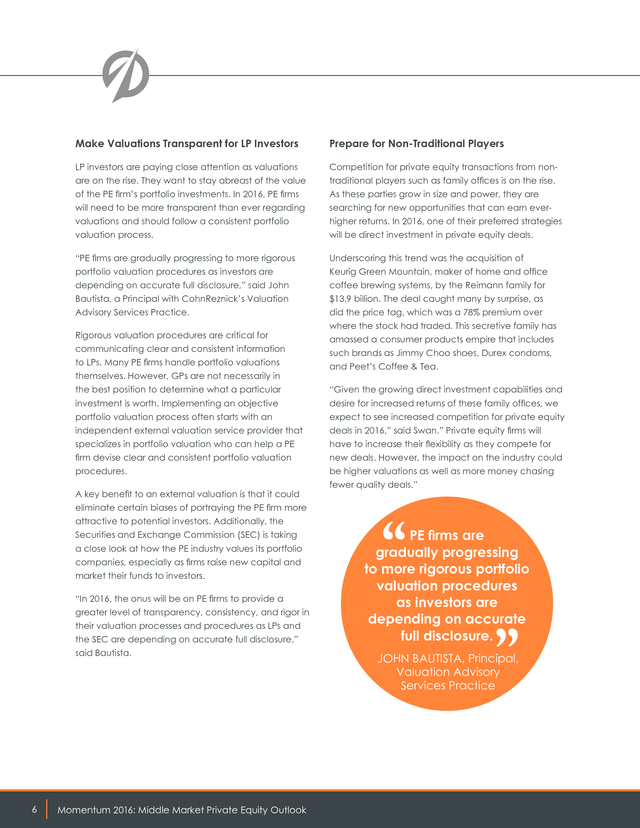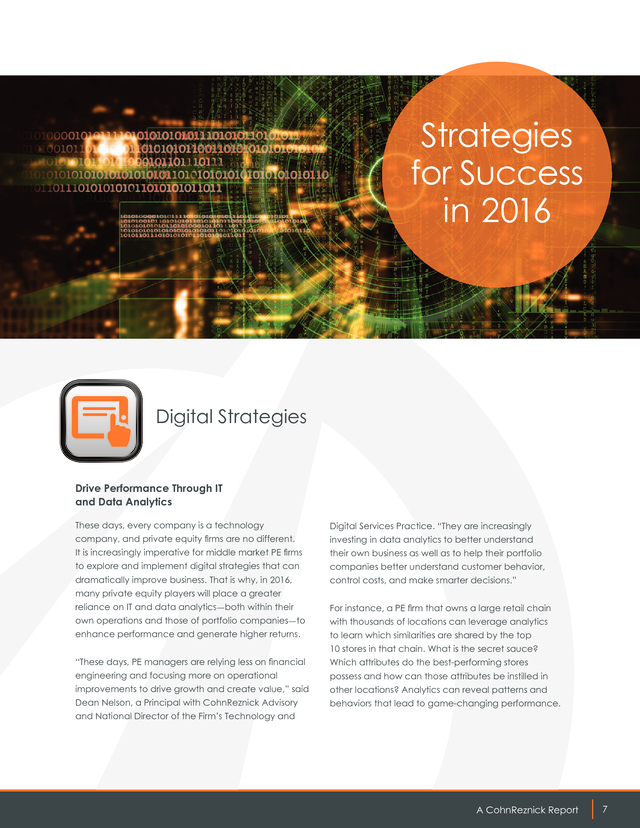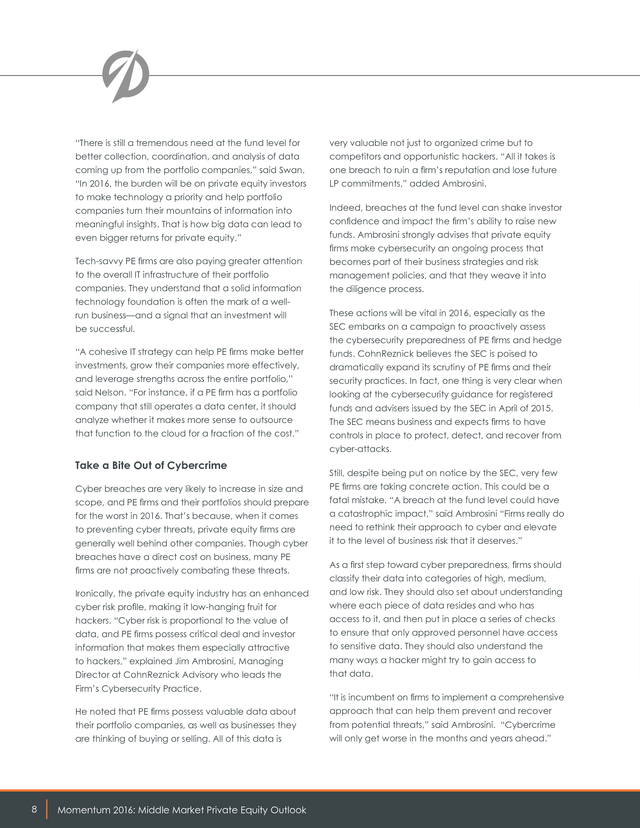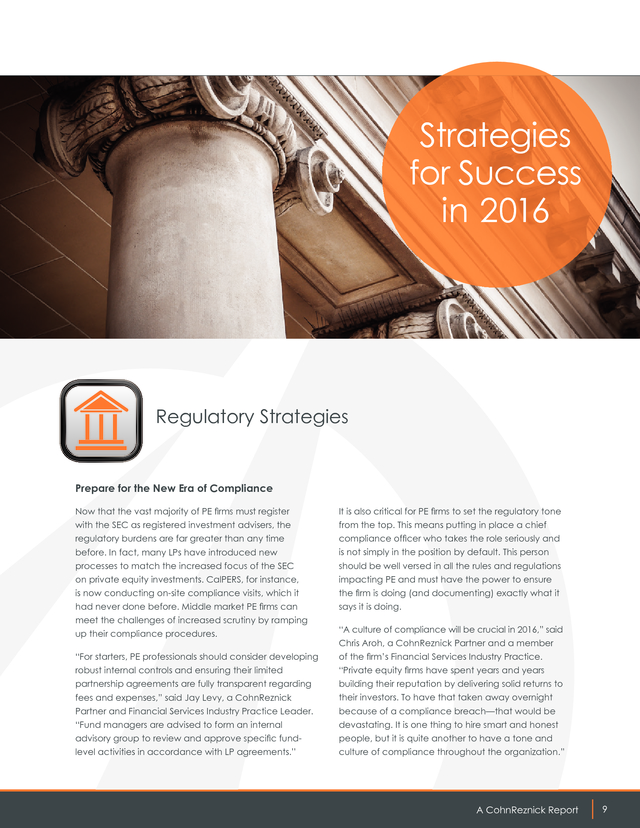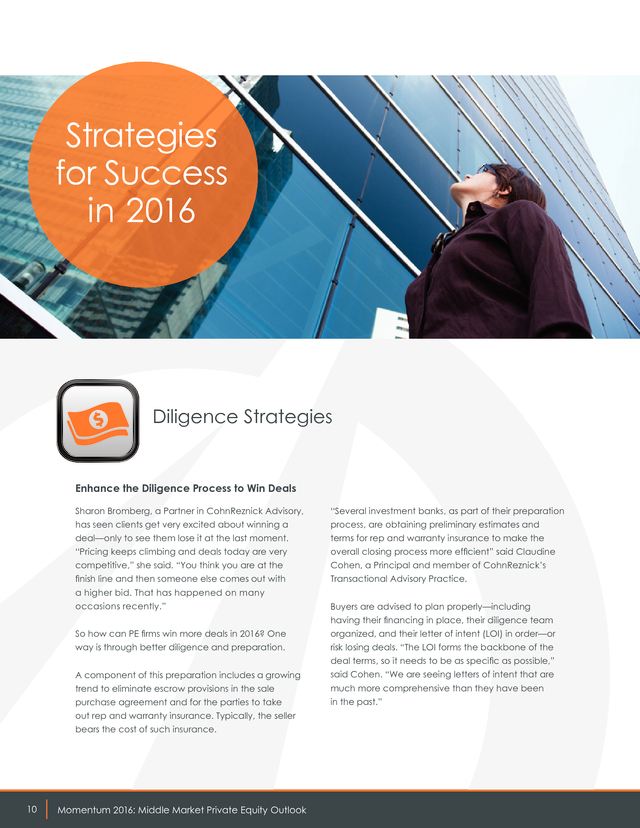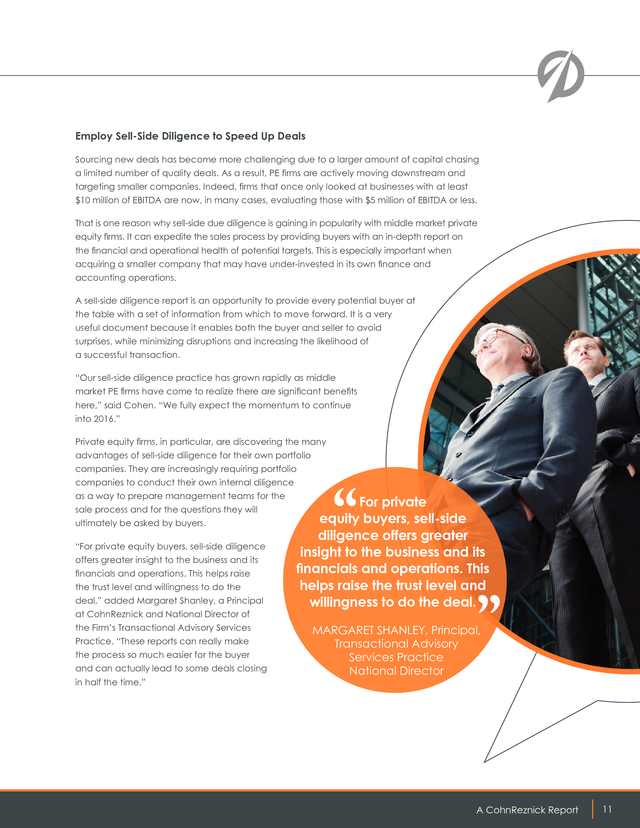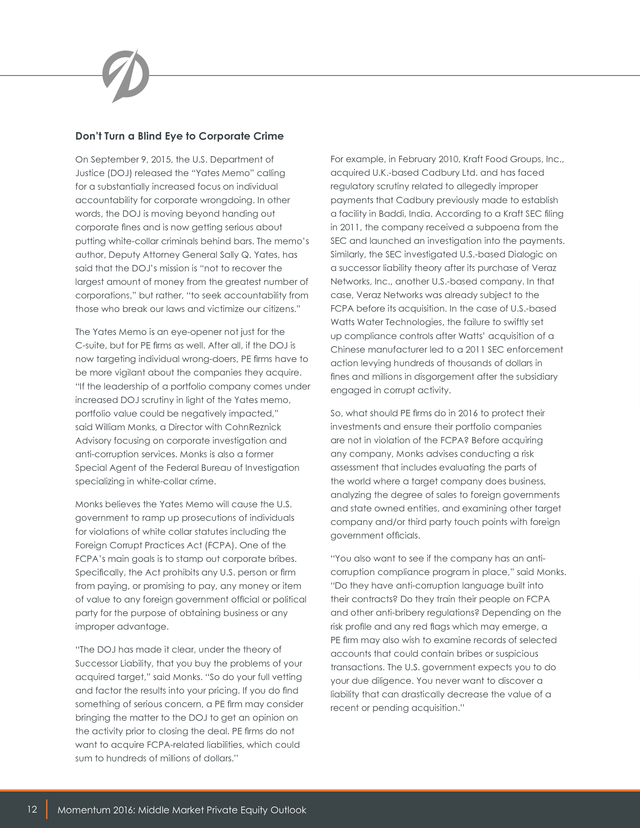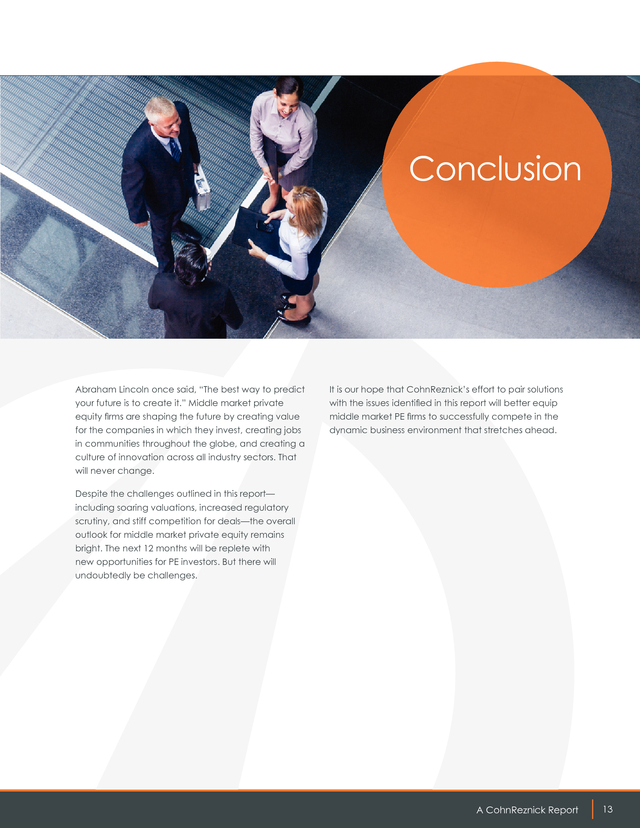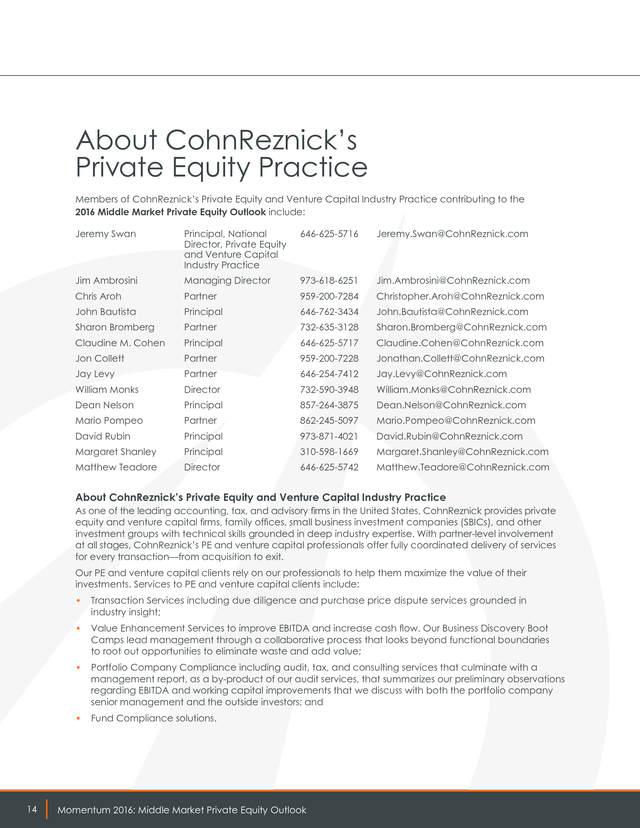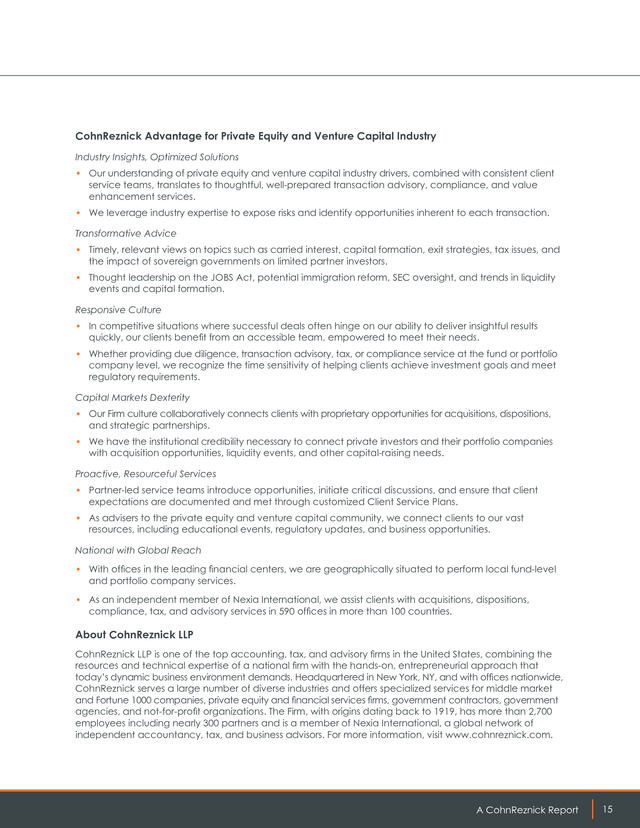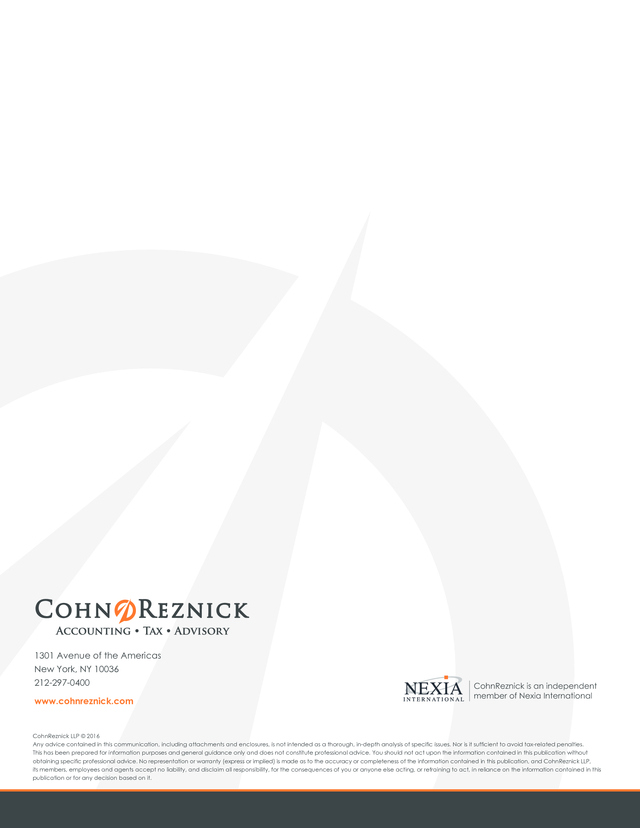Description
MOMENTUM 2016
Middle Market
Private Equity
Outlook
A 2016 CohnReznick LLP Report
. Regulatory Issues...
6
mo • men • tum
noun: impetus and driving force gained by the
development of a process or course of events
. ..
Table of
Contents
Industry Overview........................................................................1
Strategies for Success in 2016 .....................................................2
• Deal Strategies ...................................................................................... 2
• Digital Strategies ................................................................................... 7
• Regulatory Strategies ........................................................................... 9
• Diligence Strategies............................................................................
10 Conclusion .................................................................................13 A CohnReznick Report 3 . Preface As we move forward into 2016, there are many unknown factors ahead for the private equity industry. How will interest rate hikes impact the markets/economy and how many more times will the Fed raise rates? How will the buildup to, and outcome of, the presidential election influence the financial markets? What does an economic slowdown in China or other nations mean for investment opportunities both at home and abroad? These ever-changing dynamics will present private equity players with both challenges to navigate and opportunities to seize over the next 12 months. CohnReznick’s 2016 Middle Market Private Equity Outlook analyzes the key issues and activity drivers that will most likely impact the private equity industry in the coming year. Driven in part by fresh perspectives on longstanding issues, as well as new insights into game changing developments, this report identifies the emerging trends, opportunities, and challenges on the horizon that will inspire private equity firms to embrace new strategies and compete more effectively. Although it is impossible to predict precisely what the year ahead will bring, we expect to see increased momentum in the private equity sector. This report highlights the issues that will gain traction in 2016, and provides strategic ideas to assist middle market private equity firms as they adapt to a constantly evolving business environment. Jeremy Swan Principal National Director, Private Equity and Venture Capital Industry Practice January 2016 Jeremy Swan . Industry Overview William Shakespeare said it best: “What’s past is The fierce competition from strategic acquirers prologue.” The past helps define the present and resulted in a steep decline in overall private equity sets the stage for the future. So, to assess what may deal activity. Just 5% of the $2.6 trillion in deals happen in the private equity industry in 2016, it is first announced as of August 2015 were private equity necessary to understand what transpired in 2015. backed, down from 9% over the same period in 2014, Beyond a doubt, the story of the year in private equity was soaring valuations. Fueled by a potent mix of and the lowest percentage for any similar period in 14 years, according to data from Dealogic. ultra-low financing costs and a highly competitive But that is not to say that middle market PE firms sat M&A market, valuations climbed to new heights idle last year.
Instead of buying companies, many in 2015, reaching record levels of 16 times EBITDA PE shops were busy taking advantage of the seller’s in the U.S., according to Thomson Reuters. In fact, market and preparing their portfolio companies for exit. the valuation story for private companies is in stark contrast to what is happening in the public markets, where prices are softening. Some companies, like mobile payments provider Square, even saw their valuations plummet once they went public.
Square’s initial IPO share price of $9 put its valuation at $2.9 billion—half of where the company was priced at an earlier private-financing round. Shares “PE firms were selling everything that was not nailed down,” said Jeremy Swan, National Director of CohnReznick’s Private Equity and Venture Capital Industry Practice. “If you look at our transaction business, historically it has been 50% buy side and 50% sell side, and as high as 75% buy side and 25% sell side in some years.
But last year, the majority of our work ultimately closed at $13.07 on the first trading day. was sell side. We saw a real shift in the market. So while While many middle market private equity investors opportune time for them to exit portfolio companies.” it is a tough time for PE firms to get deals done, it is an had a difficult time justifying the towering multiples, the same could not be said for cash-rich strategic acquirers who pushed deal prices beyond the reach of many PE buyers.
Home Depot, for instance, recently outbid several PE firms in its $1.63 billion acquisition of Interline Brands, Inc. A CohnReznick Report 1 . Strategies for Success in 2016 Strong strategic planning is critical to success in the private equity industry. Here are a number of strategies that forward-thinking PE firms should consider implementing to help ensure they remain at the top of their game in 2016. Deal Strategies Become the Buyer of Choice In 2016, middle market private equity firms will need to differentiate themselves and become the buyer hone their origination and acquisition skills. With piles of choice, even if they are not financially the of dry powder—or uninvested capital— still waiting to highest bidder.” be put to work, it is reasonable to expect an overall increase in deal activity in 2016. However, to win more For PE firms, differentiation can mean developing and deals, PE firms should focus less on the auction process executing with deep expertise in several key industries, and more on driving their own proprietary deal flow. and staffing their firms with experienced personnel And, if they are involved in the auction process, they with deep industry knowledge who understand those must develop strategies to position themselves as the markets inside and out.
These firms can potentially “buyer of choice” to win those deals. uncover superior opportunities, generate proprietary deal flow, and provide more effective advice and “In today’s active M&A market, you have a lot connections to portfolio companies, especially of different parties looking at the same assets,” compared to their non-specialized competitors. said Swan. “To compete, PE firms really need to 2 Momentum 2016: Middle Market Private Equity Outlook . Specialization is particularly important to sellers that plan to retain an ownership stake in the business and want to partner with a private equity firm that can add the most value posttransaction. Entrepreneurs and business owners are increasingly eager to team with PE firms that can quickly leverage their industry knowledge and make an immediate impact on the portfolio company. “PE firms will need to differentiate themselves in 2016 by showing they are not just bringing capital to the table, but are also bringing value-add from a strategic perspective,” said Swan. “To position themselves as the buyer of choice, PE firms must bring a laser-like focus to a particular industry or sector, and they must take a more operational role to drive the growth of their portfolio companies, involving themselves like never before.” Hunt for Proprietary Deal Flow PE firms that want to be successful in 2016 should not only focus on differentiation, but also on sourcing deals outside of the auction process. “With valuations at or near record levels, it’s more important than ever for PE firms to really focus on driving proprietary deal flow,” said Swan. Sourcing new and proprietary deals will continue to be one of the industry’s most significant challenges in 2016, attributable in large part to the massive amounts of capital chasing a smaller number of quality opportunities. As a result, savvy PE firms are increasingly networking with industry leaders and building relationships with target companies that may not yet be ready for an investment today, but could be looking for a private equity partner several years down the road. Additionally, the best firms are building up their internal business development and deal sourcing functions in an effort to leave no stone unturned.
“Five years ago, only about 10% of the top quartile funds had an internal deal origination function,” said Swan. “Instead, they relied on referrals from investment bankers and on auctions. Today, more than 40% of those top firms have a formalized process for deal sourcing.
They have seen the need to spend time and money developing that function in-house.” “ With valuations at or near record levels, it’s more important than ever for PE ï¬rms to really focus on driving proprietary deal flow. ” JEREMY SWAN, Principal, National Director, Private Equity and Venture Capital Industry Practice He adds that PE firms will continue to feel pressure from limited partners (LPs) to find proprietary deals and put money to work at reasonable valuations. “The LPs want to invest in firms that have an internal deal-generation engine and are uncovering their own deal flow,” said Swan. “LPs are often less interested in firms that solely compete in auctions and overpay to win deals.” A CohnReznick Report 3 .
“ Going forward into 2016, CFOs need to lead the charge as they transform the ï¬nance department from a purely transactional role to one that is creating tangible value for the business. ” DAVID RUBIN, Principal, Risk and Business Advisory National Director Target the Baby Boomers Baby boomers are turning 65 en masse. Every day, 10,000 boomers hit the typical retirement age of 65. That is four million a year. Many retiring baby boomers are business owners. In fact, boomers are a generation PE firms should pay special attention to these boomer businesses in 2016 as they could prove to be a significant source of deal flow.
“Owners, of course, are focused on sale price, but they are also attaching value to the less quantitative and more qualitative benefits that PE firms can provide,” said Swan. Focus on the CFO In the current seller’s market, middle market PE firms are being forced to pay a premium for deals, or risk losing out. So how can they justify paying prices they know are exorbitant? “To realize value in the face of higher multiples, you need to have greater effectiveness in the way you operate the business and draw value out of the business,” said David Rubin, a Principal with CohnReznick Advisory and National Director of the Firm’s Risk and Business Advisory Practice. of entrepreneurs. More businesses were founded by One way to achieve that is by demanding an people born in the years 1946-1964 than any generation enhanced level of support and service from the ever.
A whopping two-thirds of all businesses with finance function. PE firms are expecting more from employees are owned by baby boomers. the CFOs of their portfolio companies. Specifically, As boomer business owners retire, they must decide what to do with the businesses they have built.
In generations past, succession was straightforward. The majority of retiring owners simply handed off their they want finance departments that are not only skilled at accounting and bookkeeping, but can also partner with the C-suite and add strategic value to the business. business to the next generation. But baby boomers “Going forward into 2016, CFOs need to lead the tend to have far fewer kids than their parents did. And charge as they transform the finance department many children of boomers are simply not interested in from a purely transactional role to one that is creating taking over the family business. tangible value for the business,” added Rubin.
“This Still, boomers take great pride in their businesses. They want to ensure their companies are handed down to competent new owners who can continue the tradition of success. “Many middle market businesses means that middle market PE firms should champion CFOs who really understand the cost drivers and revenue drivers of the organization and know how to leverage those drivers to create more efficiencies.” have been in the same family for generations and the With a strong CFO function in place, PE firms can gain owners really care about the business ending up in a higher degree of confidence in their acquisitions, the right hands,” said Swan.
“They are concerned even if they are paying multiples that exceed their about bringing on the right partner from a financial historical comfort zone. “We have seen PE firms shut and strategic perspective. They want a buyer who out of deals because the high valuations did not will take the business to the next level, but who also conform to their financial models,” explained Mario cares about the employee base and is committed Pompeo, who leads CohnReznick’s CFO Advisory to keeping the business in the same geography Practice.
“But, in many ways, 2016 could be the year and community.” 4 Momentum 2016: Middle Market Private Equity Outlook . of the CFO. With an effective finance and accounting organization led by a CFO focused on lowering costs, increasing revenue, managing risk, and creating value, PE firms can take on an adjusted level of risk and even justify a higher purchase price.” Overcome Integration Issues PE firms frequently acquire a platform company and then make numerous add-on acquisitions to quickly grow the business. Often, however, the integration of these companies is not well thought out, which could hurt operations down the road. “It’s not just private equity,” said Swan.
“Across the spectrum, 50 to 80% of all acquisitions that fail do so because the companies are not well integrated.” For example, it was previously common practice for private equity buyers to examine a target company’s IT infrastructure only after the deal closed. But this often led to unforeseen expenses as PE firms realized too late they would have to invest in new hardware, software, and services to scale the acquired business and make it more competitive in the marketplace. “PE firms are advised to start thinking about the integration process very early on, well before they consummate an add-on acquisition,” said Swan. “As part of the diligence process, they should be planning how the company’s accounting systems, finance teams, and IT platforms will be consolidated.” When conducting IT due diligence, private equity buyers should ensure that all business systems, including customer support, manufacturing, and HR applications, are modernized, well-implemented and integrated. “From the moment the deal closes, the business needs to be able to start running on a combined basis—including an integrated IT platform,” said Swan. Portfolio companies that are well integrated will achieve the greatest level of success and, ultimately, generate the highest returns in 2016. “ From the moment the deal closes, the business needs to be able to start running on a combined basis— including an integrated IT platform. ” JEREMY SWAN, Principal, National Director, Private Equity and Venture Capital Industry Practice A CohnReznick Report 5 .
Make Valuations Transparent for LP Investors Prepare for Non-Traditional Players LP investors are paying close attention as valuations Competition for private equity transactions from non- are on the rise. They want to stay abreast of the value traditional players such as family offices is on the rise. of the PE firm’s portfolio investments. In 2016, PE firms As these parties grow in size and power, they are will need to be more transparent than ever regarding searching for new opportunities that can earn ever- valuations and should follow a consistent portfolio higher returns. In 2016, one of their preferred strategies valuation process. will be direct investment in private equity deals. “PE firms are gradually progressing to more rigorous Underscoring this trend was the acquisition of portfolio valuation procedures as investors are Keurig Green Mountain, maker of home and office depending on accurate full disclosure,” said John coffee brewing systems, by the Reimann family for Bautista, a Principal with CohnReznick’s Valuation $13.9 billion.
The deal caught many by surprise, as Advisory Services Practice. did the price tag, which was a 78% premium over Rigorous valuation procedures are critical for communicating clear and consistent information to LPs. Many PE firms handle portfolio valuations themselves. However, GPs are not necessarily in where the stock had traded.
This secretive family has amassed a consumer products empire that includes such brands as Jimmy Choo shoes, Durex condoms, and Peet’s Coffee & Tea. the best position to determine what a particular “Given the growing direct investment capabilities and investment is worth. Implementing an objective desire for increased returns of these family offices, we portfolio valuation process often starts with an expect to see increased competition for private equity independent external valuation service provider that deals in 2016,” said Swan.” Private equity firms will specializes in portfolio valuation who can help a PE have to increase their flexibility as they compete for firm devise clear and consistent portfolio valuation new deals. However, the impact on the industry could procedures. be higher valuations as well as more money chasing A key benefit to an external valuation is that it could eliminate certain biases of portraying the PE firm more attractive to potential investors.
Additionally, the Securities and Exchange Commission (SEC) is taking a close look at how the PE industry values its portfolio companies, especially as firms raise new capital and market their funds to investors. “In 2016, the onus will be on PE firms to provide a greater level of transparency, consistency, and rigor in their valuation processes and procedures as LPs and the SEC are depending on accurate full disclosure,” said Bautista. 6 Momentum 2016: Middle Market Private Equity Outlook fewer quality deals.” “ PE ï¬rms are gradually progressing to more rigorous portfolio valuation procedures as investors are depending on accurate full disclosure. ” JOHN BAUTISTA, Principal, Valuation Advisory Services Practice . Strategies for Success in 2016 Digital Strategies Drive Performance Through IT and Data Analytics These days, every company is a technology Digital Services Practice. “They are increasingly company, and private equity firms are no different. investing in data analytics to better understand It is increasingly imperative for middle market PE firms their own business as well as to help their portfolio to explore and implement digital strategies that can companies better understand customer behavior, dramatically improve business. That is why, in 2016, control costs, and make smarter decisions.” many private equity players will place a greater reliance on IT and data analytics—both within their For instance, a PE firm that owns a large retail chain own operations and those of portfolio companies—to with thousands of locations can leverage analytics enhance performance and generate higher returns. to learn which similarities are shared by the top 10 stores in that chain. What is the secret sauce? “These days, PE managers are relying less on financial Which attributes do the best-performing stores engineering and focusing more on operational possess and how can those attributes be instilled in improvements to drive growth and create value,” said other locations? Analytics can reveal patterns and Dean Nelson, a Principal with CohnReznick Advisory behaviors that lead to game-changing performance. and National Director of the Firm’s Technology and A CohnReznick Report 7 .
“There is still a tremendous need at the fund level for very valuable not just to organized crime but to better collection, coordination, and analysis of data competitors and opportunistic hackers. “All it takes is coming up from the portfolio companies,” said Swan. one breach to ruin a firm’s reputation and lose future “In 2016, the burden will be on private equity investors LP commitments,” added Ambrosini. to make technology a priority and help portfolio companies turn their mountains of information into meaningful insights. That is how big data can lead to Indeed, breaches at the fund level can shake investor confidence and impact the firm’s ability to raise new even bigger returns for private equity.” funds. Ambrosini strongly advises that private equity Tech-savvy PE firms are also paying greater attention becomes part of their business strategies and risk to the overall IT infrastructure of their portfolio management policies, and that they weave it into companies.
They understand that a solid information the diligence process. technology foundation is often the mark of a wellrun business—and a signal that an investment will firms make cybersecurity an ongoing process that These actions will be vital in 2016, especially as the be successful. SEC embarks on a campaign to proactively assess “A cohesive IT strategy can help PE firms make better funds. CohnReznick believes the SEC is poised to investments, grow their companies more effectively, and leverage strengths across the entire portfolio,” said Nelson. “For instance, if a PE firm has a portfolio company that still operates a data center, it should analyze whether it makes more sense to outsource that function to the cloud for a fraction of the cost.” the cybersecurity preparedness of PE firms and hedge dramatically expand its scrutiny of PE firms and their security practices.
In fact, one thing is very clear when looking at the cybersecurity guidance for registered funds and advisers issued by the SEC in April of 2015. The SEC means business and expects firms to have controls in place to protect, detect, and recover from cyber-attacks. Take a Bite Out of Cybercrime Cyber breaches are very likely to increase in size and scope, and PE firms and their portfolios should prepare for the worst in 2016. That’s because, when it comes to preventing cyber threats, private equity firms are generally well behind other companies. Though cyber breaches have a direct cost on business, many PE firms are not proactively combating these threats. Ironically, the private equity industry has an enhanced cyber risk profile, making it low-hanging fruit for hackers.
“Cyber risk is proportional to the value of data, and PE firms possess critical deal and investor information that makes them especially attractive to hackers,” explained Jim Ambrosini, Managing Director at CohnReznick Advisory who leads the Firm’s Cybersecurity Practice. Still, despite being put on notice by the SEC, very few PE firms are taking concrete action. This could be a fatal mistake. “A breach at the fund level could have a catastrophic impact,” said Ambrosini “Firms really do need to rethink their approach to cyber and elevate it to the level of business risk that it deserves.” As a first step toward cyber preparedness, firms should classify their data into categories of high, medium, and low risk.
They should also set about understanding where each piece of data resides and who has access to it, and then put in place a series of checks to ensure that only approved personnel have access to sensitive data. They should also understand the many ways a hacker might try to gain access to that data. “It is incumbent on firms to implement a comprehensive He noted that PE firms possess valuable data about their portfolio companies, as well as businesses they from potential threats,” said Ambrosini. “Cybercrime are thinking of buying or selling.
All of this data is 8 approach that can help them prevent and recover will only get worse in the months and years ahead.” Momentum 2016: Middle Market Private Equity Outlook . Strategies for Success in 2016 Regulatory Strategies Prepare for the New Era of Compliance Now that the vast majority of PE firms must register It is also critical for PE firms to set the regulatory tone with the SEC as registered investment advisers, the from the top. This means putting in place a chief regulatory burdens are far greater than any time compliance officer who takes the role seriously and before. In fact, many LPs have introduced new is not simply in the position by default. This person processes to match the increased focus of the SEC should be well versed in all the rules and regulations on private equity investments.
CalPERS, for instance, impacting PE and must have the power to ensure is now conducting on-site compliance visits, which it the firm is doing (and documenting) exactly what it had never done before. Middle market PE firms can says it is doing. meet the challenges of increased scrutiny by ramping up their compliance procedures. “A culture of compliance will be crucial in 2016,” said “For starters, PE professionals should consider developing of the firm’s Financial Services Industry Practice. robust internal controls and ensuring their limited “Private equity firms have spent years and years partnership agreements are fully transparent regarding building their reputation by delivering solid returns to fees and expenses,” said Jay Levy, a CohnReznick their investors. To have that taken away overnight Partner and Financial Services Industry Practice Leader. because of a compliance breach—that would be “Fund managers are advised to form an internal devastating.
It is one thing to hire smart and honest advisory group to review and approve specific fund- people, but it is quite another to have a tone and level activities in accordance with LP agreements.” culture of compliance throughout the organization.” Chris Aroh, a CohnReznick Partner and a member A CohnReznick Report 9 . Strategies for Success in 2016 Diligence Strategies Enhance the Diligence Process to Win Deals Sharon Bromberg, a Partner in CohnReznick Advisory, “Several investment banks, as part of their preparation has seen clients get very excited about winning a process, are obtaining preliminary estimates and deal—only to see them lose it at the last moment. terms for rep and warranty insurance to make the “Pricing keeps climbing and deals today are very overall closing process more efficient” said Claudine competitive,” she said. “You think you are at the Cohen, a Principal and member of CohnReznick’s finish line and then someone else comes out with Transactional Advisory Practice. a higher bid. That has happened on many occasions recently.” Buyers are advised to plan properly—including having their financing in place, their diligence team So how can PE firms win more deals in 2016? One organized, and their letter of intent (LOI) in order—or way is through better diligence and preparation. risk losing deals. “The LOI forms the backbone of the deal terms, so it needs to be as specific as possible,” A component of this preparation includes a growing said Cohen.
“We are seeing letters of intent that are trend to eliminate escrow provisions in the sale much more comprehensive than they have been purchase agreement and for the parties to take in the past.” out rep and warranty insurance. Typically, the seller bears the cost of such insurance. 10 Momentum 2016: Middle Market Private Equity Outlook . Employ Sell-Side Diligence to Speed Up Deals Sourcing new deals has become more challenging due to a larger amount of capital chasing a limited number of quality deals. As a result, PE firms are actively moving downstream and targeting smaller companies. Indeed, firms that once only looked at businesses with at least $10 million of EBITDA are now, in many cases, evaluating those with $5 million of EBITDA or less. That is one reason why sell-side due diligence is gaining in popularity with middle market private equity firms. It can expedite the sales process by providing buyers with an in-depth report on the financial and operational health of potential targets.
This is especially important when acquiring a smaller company that may have under-invested in its own finance and accounting operations. A sell-side diligence report is an opportunity to provide every potential buyer at the table with a set of information from which to move forward. It is a very useful document because it enables both the buyer and seller to avoid surprises, while minimizing disruptions and increasing the likelihood of a successful transaction. “Our sell-side diligence practice has grown rapidly as middle market PE firms have come to realize there are significant benefits here,” said Cohen. “We fully expect the momentum to continue into 2016.” Private equity firms, in particular, are discovering the many advantages of sell-side diligence for their own portfolio companies.
They are increasingly requiring portfolio companies to conduct their own internal diligence as a way to prepare management teams for the sale process and for the questions they will ultimately be asked by buyers. “For private equity buyers, sell-side diligence offers greater insight to the business and its financials and operations. This helps raise the trust level and willingness to do the deal,” added Margaret Shanley, a Principal at CohnReznick and National Director of the Firm’s Transactional Advisory Services Practice. “These reports can really make the process so much easier for the buyer and can actually lead to some deals closing in half the time.” “ For private equity buyers, sell-side diligence offers greater insight to the business and its ï¬nancials and operations.
This helps raise the trust level and willingness to do the deal. ” MARGARET SHANLEY, Principal, Transactional Advisory Services Practice National Director A CohnReznick Report 11 . Don’t Turn a Blind Eye to Corporate Crime On September 9, 2015, the U.S. Department of For example, in February 2010, Kraft Food Groups, Inc., Justice (DOJ) released the “Yates Memo” calling acquired U.K.-based Cadbury Ltd. and has faced for a substantially increased focus on individual regulatory scrutiny related to allegedly improper accountability for corporate wrongdoing. In other payments that Cadbury previously made to establish words, the DOJ is moving beyond handing out a facility in Baddi, India.
According to a Kraft SEC filing corporate fines and is now getting serious about in 2011, the company received a subpoena from the putting white-collar criminals behind bars. The memo’s SEC and launched an investigation into the payments. author, Deputy Attorney General Sally Q. Yates, has Similarly, the SEC investigated U.S.-based Dialogic on said that the DOJ’s mission is “not to recover the a successor liability theory after its purchase of Veraz largest amount of money from the greatest number of Networks, Inc., another U.S.-based company.
In that corporations,” but rather, “to seek accountability from case, Veraz Networks was already subject to the those who break our laws and victimize our citizens.” FCPA before its acquisition. In the case of U.S.-based The Yates Memo is an eye-opener not just for the C-suite, but for PE firms as well. After all, if the DOJ is now targeting individual wrong-doers, PE firms have to be more vigilant about the companies they acquire. “If the leadership of a portfolio company comes under increased DOJ scrutiny in light of the Yates memo, Watts Water Technologies, the failure to swiftly set up compliance controls after Watts’ acquisition of a Chinese manufacturer led to a 2011 SEC enforcement action levying hundreds of thousands of dollars in fines and millions in disgorgement after the subsidiary engaged in corrupt activity. portfolio value could be negatively impacted,” So, what should PE firms do in 2016 to protect their said William Monks, a Director with CohnReznick investments and ensure their portfolio companies Advisory focusing on corporate investigation and are not in violation of the FCPA? Before acquiring anti-corruption services.
Monks is also a former any company, Monks advises conducting a risk Special Agent of the Federal Bureau of Investigation assessment that includes evaluating the parts of specializing in white-collar crime. the world where a target company does business, Monks believes the Yates Memo will cause the U.S. government to ramp up prosecutions of individuals for violations of white collar statutes including the Foreign Corrupt Practices Act (FCPA). One of the analyzing the degree of sales to foreign governments and state owned entities, and examining other target company and/or third party touch points with foreign government officials. FCPA’s main goals is to stamp out corporate bribes. “You also want to see if the company has an anti- Specifically, the Act prohibits any U.S. person or firm corruption compliance program in place,” said Monks. from paying, or promising to pay, any money or item “Do they have anti-corruption language built into of value to any foreign government official or political their contracts? Do they train their people on FCPA party for the purpose of obtaining business or any and other anti-bribery regulations? Depending on the improper advantage. risk profile and any red flags which may emerge, a “The DOJ has made it clear, under the theory of Successor Liability, that you buy the problems of your acquired target,” said Monks.
“So do your full vetting and factor the results into your pricing. If you do find something of serious concern, a PE firm may consider bringing the matter to the DOJ to get an opinion on the activity prior to closing the deal. PE firms do not want to acquire FCPA-related liabilities, which could sum to hundreds of millions of dollars.” 12 Momentum 2016: Middle Market Private Equity Outlook PE firm may also wish to examine records of selected accounts that could contain bribes or suspicious transactions.
The U.S. government expects you to do your due diligence. You never want to discover a liability that can drastically decrease the value of a recent or pending acquisition.” .
Conclusion Abraham Lincoln once said, “The best way to predict It is our hope that CohnReznick’s effort to pair solutions your future is to create it.” Middle market private with the issues identified in this report will better equip equity firms are shaping the future by creating value middle market PE firms to successfully compete in the for the companies in which they invest, creating jobs dynamic business environment that stretches ahead. in communities throughout the globe, and creating a culture of innovation across all industry sectors. That will never change. Despite the challenges outlined in this report— including soaring valuations, increased regulatory scrutiny, and stiff competition for deals—the overall outlook for middle market private equity remains bright. The next 12 months will be replete with new opportunities for PE investors. But there will undoubtedly be challenges. A CohnReznick Report 13 .
About CohnReznick’s Private Equity Practice Members of CohnReznick’s Private Equity and Venture Capital Industry Practice contributing to the 2016 Middle Market Private Equity Outlook include: Jeremy Swan Principal, National Director, Private Equity and Venture Capital Industry Practice 646-625-5716 Jeremy.Swan@CohnReznick.com Jim Ambrosini Managing Director 973-618-6251 Jim.Ambrosini@CohnReznick.com Chris Aroh Partner 959-200-7284 Christopher.Aroh@CohnReznick.com John Bautista Principal 646-762-3434 John.Bautista@CohnReznick.com Sharon Bromberg Partner 732-635-3128 Sharon.Bromberg@CohnReznick.com Claudine M. Cohen Principal 646-625-5717 Claudine.Cohen@CohnReznick.com Jon Collett Partner 959-200-7228 Jonathan.Collett@CohnReznick.com Jay Levy Partner 646-254-7412 Jay.Levy@CohnReznick.com William Monks Director 732-590-3948 William.Monks@CohnReznick.com Dean Nelson Principal 857-264-3875 Dean.Nelson@CohnReznick.com Mario Pompeo Partner 862-245-5097 Mario.Pompeo@CohnReznick.com David Rubin Principal 973-871-4021 David.Rubin@CohnReznick.com Margaret Shanley Principal 310-598-1669 Margaret.Shanley@CohnReznick.com Matthew Teadore Director 646-625-5742 Matthew.Teadore@CohnReznick.com About CohnReznick’s Private Equity and Venture Capital Industry Practice As one of the leading accounting, tax, and advisory firms in the United States, CohnReznick provides private equity and venture capital firms, family offices, small business investment companies (SBICs), and other investment groups with technical skills grounded in deep industry expertise. With partner-level involvement at all stages, CohnReznick’s PE and venture capital professionals offer fully coordinated delivery of services for every transaction—from acquisition to exit. Our PE and venture capital clients rely on our professionals to help them maximize the value of their investments. Services to PE and venture capital clients include: • Transaction Services including due diligence and purchase price dispute services grounded in industry insight; • Value Enhancement Services to improve EBITDA and increase cash flow.
Our Business Discovery Boot Camps lead management through a collaborative process that looks beyond functional boundaries to root out opportunities to eliminate waste and add value; • Portfolio Company Compliance including audit, tax, and consulting services that culminate with a management report, as a by-product of our audit services, that summarizes our preliminary observations regarding EBITDA and working capital improvements that we discuss with both the portfolio company senior management and the outside investors; and • Fund Compliance solutions. 14 Momentum 2016: Middle Market Private Equity Outlook . CohnReznick Advantage for Private Equity and Venture Capital Industry Industry Insights, Optimized Solutions • Our understanding of private equity and venture capital industry drivers, combined with consistent client service teams, translates to thoughtful, well-prepared transaction advisory, compliance, and value enhancement services. • We leverage industry expertise to expose risks and identify opportunities inherent to each transaction. Transformative Advice • Timely, relevant views on topics such as carried interest, capital formation, exit strategies, tax issues, and the impact of sovereign governments on limited partner investors. • Thought leadership on the JOBS Act, potential immigration reform, SEC oversight, and trends in liquidity events and capital formation. Responsive Culture • In competitive situations where successful deals often hinge on our ability to deliver insightful results quickly, our clients benefit from an accessible team, empowered to meet their needs. • Whether providing due diligence, transaction advisory, tax, or compliance service at the fund or portfolio company level, we recognize the time sensitivity of helping clients achieve investment goals and meet regulatory requirements. Capital Markets Dexterity • Our Firm culture collaboratively connects clients with proprietary opportunities for acquisitions, dispositions, and strategic partnerships. • We have the institutional credibility necessary to connect private investors and their portfolio companies with acquisition opportunities, liquidity events, and other capital-raising needs. Proactive, Resourceful Services • Partner-led service teams introduce opportunities, initiate critical discussions, and ensure that client expectations are documented and met through customized Client Service Plans. • As advisers to the private equity and venture capital community, we connect clients to our vast resources, including educational events, regulatory updates, and business opportunities. National with Global Reach • With offices in the leading financial centers, we are geographically situated to perform local fund-level and portfolio company services. • As an independent member of Nexia International, we assist clients with acquisitions, dispositions, compliance, tax, and advisory services in 590 offices in more than 100 countries. About CohnReznick LLP CohnReznick LLP is one of the top accounting, tax, and advisory firms in the United States, combining the resources and technical expertise of a national firm with the hands-on, entrepreneurial approach that today’s dynamic business environment demands. Headquartered in New York, NY, and with offices nationwide, CohnReznick serves a large number of diverse industries and offers specialized services for middle market and Fortune 1000 companies, private equity and financial services firms, government contractors, government agencies, and not-for-profit organizations. The Firm, with origins dating back to 1919, has more than 2,700 employees including nearly 300 partners and is a member of Nexia International, a global network of independent accountancy, tax, and business advisors. For more information, visit www.cohnreznick.com. A CohnReznick Report 15 .
1301 Avenue of the Americas New York, NY 10036 212-297-0400 www.cohnreznick.com CohnReznick is an independent member of Nexia International CohnReznick LLP © 2016 Any advice contained in this communication, including attachments and enclosures, is not intended as a thorough, in-depth analysis of specific issues. Nor is it sufficient to avoid tax-related penalties. This has been prepared for information purposes and general guidance only and does not constitute professional advice. You should not act upon the information contained in this publication without obtaining specific professional advice. No representation or warranty (express or implied) is made as to the accuracy or completeness of the information contained in this publication, and CohnReznick LLP, its members, employees and agents accept no liability, and disclaim all responsibility, for the consequences of you or anyone else acting, or refraining to act, in reliance on the information contained in this publication or for any decision based on it. .
10 Conclusion .................................................................................13 A CohnReznick Report 3 . Preface As we move forward into 2016, there are many unknown factors ahead for the private equity industry. How will interest rate hikes impact the markets/economy and how many more times will the Fed raise rates? How will the buildup to, and outcome of, the presidential election influence the financial markets? What does an economic slowdown in China or other nations mean for investment opportunities both at home and abroad? These ever-changing dynamics will present private equity players with both challenges to navigate and opportunities to seize over the next 12 months. CohnReznick’s 2016 Middle Market Private Equity Outlook analyzes the key issues and activity drivers that will most likely impact the private equity industry in the coming year. Driven in part by fresh perspectives on longstanding issues, as well as new insights into game changing developments, this report identifies the emerging trends, opportunities, and challenges on the horizon that will inspire private equity firms to embrace new strategies and compete more effectively. Although it is impossible to predict precisely what the year ahead will bring, we expect to see increased momentum in the private equity sector. This report highlights the issues that will gain traction in 2016, and provides strategic ideas to assist middle market private equity firms as they adapt to a constantly evolving business environment. Jeremy Swan Principal National Director, Private Equity and Venture Capital Industry Practice January 2016 Jeremy Swan . Industry Overview William Shakespeare said it best: “What’s past is The fierce competition from strategic acquirers prologue.” The past helps define the present and resulted in a steep decline in overall private equity sets the stage for the future. So, to assess what may deal activity. Just 5% of the $2.6 trillion in deals happen in the private equity industry in 2016, it is first announced as of August 2015 were private equity necessary to understand what transpired in 2015. backed, down from 9% over the same period in 2014, Beyond a doubt, the story of the year in private equity was soaring valuations. Fueled by a potent mix of and the lowest percentage for any similar period in 14 years, according to data from Dealogic. ultra-low financing costs and a highly competitive But that is not to say that middle market PE firms sat M&A market, valuations climbed to new heights idle last year.
Instead of buying companies, many in 2015, reaching record levels of 16 times EBITDA PE shops were busy taking advantage of the seller’s in the U.S., according to Thomson Reuters. In fact, market and preparing their portfolio companies for exit. the valuation story for private companies is in stark contrast to what is happening in the public markets, where prices are softening. Some companies, like mobile payments provider Square, even saw their valuations plummet once they went public.
Square’s initial IPO share price of $9 put its valuation at $2.9 billion—half of where the company was priced at an earlier private-financing round. Shares “PE firms were selling everything that was not nailed down,” said Jeremy Swan, National Director of CohnReznick’s Private Equity and Venture Capital Industry Practice. “If you look at our transaction business, historically it has been 50% buy side and 50% sell side, and as high as 75% buy side and 25% sell side in some years.
But last year, the majority of our work ultimately closed at $13.07 on the first trading day. was sell side. We saw a real shift in the market. So while While many middle market private equity investors opportune time for them to exit portfolio companies.” it is a tough time for PE firms to get deals done, it is an had a difficult time justifying the towering multiples, the same could not be said for cash-rich strategic acquirers who pushed deal prices beyond the reach of many PE buyers.
Home Depot, for instance, recently outbid several PE firms in its $1.63 billion acquisition of Interline Brands, Inc. A CohnReznick Report 1 . Strategies for Success in 2016 Strong strategic planning is critical to success in the private equity industry. Here are a number of strategies that forward-thinking PE firms should consider implementing to help ensure they remain at the top of their game in 2016. Deal Strategies Become the Buyer of Choice In 2016, middle market private equity firms will need to differentiate themselves and become the buyer hone their origination and acquisition skills. With piles of choice, even if they are not financially the of dry powder—or uninvested capital— still waiting to highest bidder.” be put to work, it is reasonable to expect an overall increase in deal activity in 2016. However, to win more For PE firms, differentiation can mean developing and deals, PE firms should focus less on the auction process executing with deep expertise in several key industries, and more on driving their own proprietary deal flow. and staffing their firms with experienced personnel And, if they are involved in the auction process, they with deep industry knowledge who understand those must develop strategies to position themselves as the markets inside and out.
These firms can potentially “buyer of choice” to win those deals. uncover superior opportunities, generate proprietary deal flow, and provide more effective advice and “In today’s active M&A market, you have a lot connections to portfolio companies, especially of different parties looking at the same assets,” compared to their non-specialized competitors. said Swan. “To compete, PE firms really need to 2 Momentum 2016: Middle Market Private Equity Outlook . Specialization is particularly important to sellers that plan to retain an ownership stake in the business and want to partner with a private equity firm that can add the most value posttransaction. Entrepreneurs and business owners are increasingly eager to team with PE firms that can quickly leverage their industry knowledge and make an immediate impact on the portfolio company. “PE firms will need to differentiate themselves in 2016 by showing they are not just bringing capital to the table, but are also bringing value-add from a strategic perspective,” said Swan. “To position themselves as the buyer of choice, PE firms must bring a laser-like focus to a particular industry or sector, and they must take a more operational role to drive the growth of their portfolio companies, involving themselves like never before.” Hunt for Proprietary Deal Flow PE firms that want to be successful in 2016 should not only focus on differentiation, but also on sourcing deals outside of the auction process. “With valuations at or near record levels, it’s more important than ever for PE firms to really focus on driving proprietary deal flow,” said Swan. Sourcing new and proprietary deals will continue to be one of the industry’s most significant challenges in 2016, attributable in large part to the massive amounts of capital chasing a smaller number of quality opportunities. As a result, savvy PE firms are increasingly networking with industry leaders and building relationships with target companies that may not yet be ready for an investment today, but could be looking for a private equity partner several years down the road. Additionally, the best firms are building up their internal business development and deal sourcing functions in an effort to leave no stone unturned.
“Five years ago, only about 10% of the top quartile funds had an internal deal origination function,” said Swan. “Instead, they relied on referrals from investment bankers and on auctions. Today, more than 40% of those top firms have a formalized process for deal sourcing.
They have seen the need to spend time and money developing that function in-house.” “ With valuations at or near record levels, it’s more important than ever for PE ï¬rms to really focus on driving proprietary deal flow. ” JEREMY SWAN, Principal, National Director, Private Equity and Venture Capital Industry Practice He adds that PE firms will continue to feel pressure from limited partners (LPs) to find proprietary deals and put money to work at reasonable valuations. “The LPs want to invest in firms that have an internal deal-generation engine and are uncovering their own deal flow,” said Swan. “LPs are often less interested in firms that solely compete in auctions and overpay to win deals.” A CohnReznick Report 3 .
“ Going forward into 2016, CFOs need to lead the charge as they transform the ï¬nance department from a purely transactional role to one that is creating tangible value for the business. ” DAVID RUBIN, Principal, Risk and Business Advisory National Director Target the Baby Boomers Baby boomers are turning 65 en masse. Every day, 10,000 boomers hit the typical retirement age of 65. That is four million a year. Many retiring baby boomers are business owners. In fact, boomers are a generation PE firms should pay special attention to these boomer businesses in 2016 as they could prove to be a significant source of deal flow.
“Owners, of course, are focused on sale price, but they are also attaching value to the less quantitative and more qualitative benefits that PE firms can provide,” said Swan. Focus on the CFO In the current seller’s market, middle market PE firms are being forced to pay a premium for deals, or risk losing out. So how can they justify paying prices they know are exorbitant? “To realize value in the face of higher multiples, you need to have greater effectiveness in the way you operate the business and draw value out of the business,” said David Rubin, a Principal with CohnReznick Advisory and National Director of the Firm’s Risk and Business Advisory Practice. of entrepreneurs. More businesses were founded by One way to achieve that is by demanding an people born in the years 1946-1964 than any generation enhanced level of support and service from the ever.
A whopping two-thirds of all businesses with finance function. PE firms are expecting more from employees are owned by baby boomers. the CFOs of their portfolio companies. Specifically, As boomer business owners retire, they must decide what to do with the businesses they have built.
In generations past, succession was straightforward. The majority of retiring owners simply handed off their they want finance departments that are not only skilled at accounting and bookkeeping, but can also partner with the C-suite and add strategic value to the business. business to the next generation. But baby boomers “Going forward into 2016, CFOs need to lead the tend to have far fewer kids than their parents did. And charge as they transform the finance department many children of boomers are simply not interested in from a purely transactional role to one that is creating taking over the family business. tangible value for the business,” added Rubin.
“This Still, boomers take great pride in their businesses. They want to ensure their companies are handed down to competent new owners who can continue the tradition of success. “Many middle market businesses means that middle market PE firms should champion CFOs who really understand the cost drivers and revenue drivers of the organization and know how to leverage those drivers to create more efficiencies.” have been in the same family for generations and the With a strong CFO function in place, PE firms can gain owners really care about the business ending up in a higher degree of confidence in their acquisitions, the right hands,” said Swan.
“They are concerned even if they are paying multiples that exceed their about bringing on the right partner from a financial historical comfort zone. “We have seen PE firms shut and strategic perspective. They want a buyer who out of deals because the high valuations did not will take the business to the next level, but who also conform to their financial models,” explained Mario cares about the employee base and is committed Pompeo, who leads CohnReznick’s CFO Advisory to keeping the business in the same geography Practice.
“But, in many ways, 2016 could be the year and community.” 4 Momentum 2016: Middle Market Private Equity Outlook . of the CFO. With an effective finance and accounting organization led by a CFO focused on lowering costs, increasing revenue, managing risk, and creating value, PE firms can take on an adjusted level of risk and even justify a higher purchase price.” Overcome Integration Issues PE firms frequently acquire a platform company and then make numerous add-on acquisitions to quickly grow the business. Often, however, the integration of these companies is not well thought out, which could hurt operations down the road. “It’s not just private equity,” said Swan.
“Across the spectrum, 50 to 80% of all acquisitions that fail do so because the companies are not well integrated.” For example, it was previously common practice for private equity buyers to examine a target company’s IT infrastructure only after the deal closed. But this often led to unforeseen expenses as PE firms realized too late they would have to invest in new hardware, software, and services to scale the acquired business and make it more competitive in the marketplace. “PE firms are advised to start thinking about the integration process very early on, well before they consummate an add-on acquisition,” said Swan. “As part of the diligence process, they should be planning how the company’s accounting systems, finance teams, and IT platforms will be consolidated.” When conducting IT due diligence, private equity buyers should ensure that all business systems, including customer support, manufacturing, and HR applications, are modernized, well-implemented and integrated. “From the moment the deal closes, the business needs to be able to start running on a combined basis—including an integrated IT platform,” said Swan. Portfolio companies that are well integrated will achieve the greatest level of success and, ultimately, generate the highest returns in 2016. “ From the moment the deal closes, the business needs to be able to start running on a combined basis— including an integrated IT platform. ” JEREMY SWAN, Principal, National Director, Private Equity and Venture Capital Industry Practice A CohnReznick Report 5 .
Make Valuations Transparent for LP Investors Prepare for Non-Traditional Players LP investors are paying close attention as valuations Competition for private equity transactions from non- are on the rise. They want to stay abreast of the value traditional players such as family offices is on the rise. of the PE firm’s portfolio investments. In 2016, PE firms As these parties grow in size and power, they are will need to be more transparent than ever regarding searching for new opportunities that can earn ever- valuations and should follow a consistent portfolio higher returns. In 2016, one of their preferred strategies valuation process. will be direct investment in private equity deals. “PE firms are gradually progressing to more rigorous Underscoring this trend was the acquisition of portfolio valuation procedures as investors are Keurig Green Mountain, maker of home and office depending on accurate full disclosure,” said John coffee brewing systems, by the Reimann family for Bautista, a Principal with CohnReznick’s Valuation $13.9 billion.
The deal caught many by surprise, as Advisory Services Practice. did the price tag, which was a 78% premium over Rigorous valuation procedures are critical for communicating clear and consistent information to LPs. Many PE firms handle portfolio valuations themselves. However, GPs are not necessarily in where the stock had traded.
This secretive family has amassed a consumer products empire that includes such brands as Jimmy Choo shoes, Durex condoms, and Peet’s Coffee & Tea. the best position to determine what a particular “Given the growing direct investment capabilities and investment is worth. Implementing an objective desire for increased returns of these family offices, we portfolio valuation process often starts with an expect to see increased competition for private equity independent external valuation service provider that deals in 2016,” said Swan.” Private equity firms will specializes in portfolio valuation who can help a PE have to increase their flexibility as they compete for firm devise clear and consistent portfolio valuation new deals. However, the impact on the industry could procedures. be higher valuations as well as more money chasing A key benefit to an external valuation is that it could eliminate certain biases of portraying the PE firm more attractive to potential investors.
Additionally, the Securities and Exchange Commission (SEC) is taking a close look at how the PE industry values its portfolio companies, especially as firms raise new capital and market their funds to investors. “In 2016, the onus will be on PE firms to provide a greater level of transparency, consistency, and rigor in their valuation processes and procedures as LPs and the SEC are depending on accurate full disclosure,” said Bautista. 6 Momentum 2016: Middle Market Private Equity Outlook fewer quality deals.” “ PE ï¬rms are gradually progressing to more rigorous portfolio valuation procedures as investors are depending on accurate full disclosure. ” JOHN BAUTISTA, Principal, Valuation Advisory Services Practice . Strategies for Success in 2016 Digital Strategies Drive Performance Through IT and Data Analytics These days, every company is a technology Digital Services Practice. “They are increasingly company, and private equity firms are no different. investing in data analytics to better understand It is increasingly imperative for middle market PE firms their own business as well as to help their portfolio to explore and implement digital strategies that can companies better understand customer behavior, dramatically improve business. That is why, in 2016, control costs, and make smarter decisions.” many private equity players will place a greater reliance on IT and data analytics—both within their For instance, a PE firm that owns a large retail chain own operations and those of portfolio companies—to with thousands of locations can leverage analytics enhance performance and generate higher returns. to learn which similarities are shared by the top 10 stores in that chain. What is the secret sauce? “These days, PE managers are relying less on financial Which attributes do the best-performing stores engineering and focusing more on operational possess and how can those attributes be instilled in improvements to drive growth and create value,” said other locations? Analytics can reveal patterns and Dean Nelson, a Principal with CohnReznick Advisory behaviors that lead to game-changing performance. and National Director of the Firm’s Technology and A CohnReznick Report 7 .
“There is still a tremendous need at the fund level for very valuable not just to organized crime but to better collection, coordination, and analysis of data competitors and opportunistic hackers. “All it takes is coming up from the portfolio companies,” said Swan. one breach to ruin a firm’s reputation and lose future “In 2016, the burden will be on private equity investors LP commitments,” added Ambrosini. to make technology a priority and help portfolio companies turn their mountains of information into meaningful insights. That is how big data can lead to Indeed, breaches at the fund level can shake investor confidence and impact the firm’s ability to raise new even bigger returns for private equity.” funds. Ambrosini strongly advises that private equity Tech-savvy PE firms are also paying greater attention becomes part of their business strategies and risk to the overall IT infrastructure of their portfolio management policies, and that they weave it into companies.
They understand that a solid information the diligence process. technology foundation is often the mark of a wellrun business—and a signal that an investment will firms make cybersecurity an ongoing process that These actions will be vital in 2016, especially as the be successful. SEC embarks on a campaign to proactively assess “A cohesive IT strategy can help PE firms make better funds. CohnReznick believes the SEC is poised to investments, grow their companies more effectively, and leverage strengths across the entire portfolio,” said Nelson. “For instance, if a PE firm has a portfolio company that still operates a data center, it should analyze whether it makes more sense to outsource that function to the cloud for a fraction of the cost.” the cybersecurity preparedness of PE firms and hedge dramatically expand its scrutiny of PE firms and their security practices.
In fact, one thing is very clear when looking at the cybersecurity guidance for registered funds and advisers issued by the SEC in April of 2015. The SEC means business and expects firms to have controls in place to protect, detect, and recover from cyber-attacks. Take a Bite Out of Cybercrime Cyber breaches are very likely to increase in size and scope, and PE firms and their portfolios should prepare for the worst in 2016. That’s because, when it comes to preventing cyber threats, private equity firms are generally well behind other companies. Though cyber breaches have a direct cost on business, many PE firms are not proactively combating these threats. Ironically, the private equity industry has an enhanced cyber risk profile, making it low-hanging fruit for hackers.
“Cyber risk is proportional to the value of data, and PE firms possess critical deal and investor information that makes them especially attractive to hackers,” explained Jim Ambrosini, Managing Director at CohnReznick Advisory who leads the Firm’s Cybersecurity Practice. Still, despite being put on notice by the SEC, very few PE firms are taking concrete action. This could be a fatal mistake. “A breach at the fund level could have a catastrophic impact,” said Ambrosini “Firms really do need to rethink their approach to cyber and elevate it to the level of business risk that it deserves.” As a first step toward cyber preparedness, firms should classify their data into categories of high, medium, and low risk.
They should also set about understanding where each piece of data resides and who has access to it, and then put in place a series of checks to ensure that only approved personnel have access to sensitive data. They should also understand the many ways a hacker might try to gain access to that data. “It is incumbent on firms to implement a comprehensive He noted that PE firms possess valuable data about their portfolio companies, as well as businesses they from potential threats,” said Ambrosini. “Cybercrime are thinking of buying or selling.
All of this data is 8 approach that can help them prevent and recover will only get worse in the months and years ahead.” Momentum 2016: Middle Market Private Equity Outlook . Strategies for Success in 2016 Regulatory Strategies Prepare for the New Era of Compliance Now that the vast majority of PE firms must register It is also critical for PE firms to set the regulatory tone with the SEC as registered investment advisers, the from the top. This means putting in place a chief regulatory burdens are far greater than any time compliance officer who takes the role seriously and before. In fact, many LPs have introduced new is not simply in the position by default. This person processes to match the increased focus of the SEC should be well versed in all the rules and regulations on private equity investments.
CalPERS, for instance, impacting PE and must have the power to ensure is now conducting on-site compliance visits, which it the firm is doing (and documenting) exactly what it had never done before. Middle market PE firms can says it is doing. meet the challenges of increased scrutiny by ramping up their compliance procedures. “A culture of compliance will be crucial in 2016,” said “For starters, PE professionals should consider developing of the firm’s Financial Services Industry Practice. robust internal controls and ensuring their limited “Private equity firms have spent years and years partnership agreements are fully transparent regarding building their reputation by delivering solid returns to fees and expenses,” said Jay Levy, a CohnReznick their investors. To have that taken away overnight Partner and Financial Services Industry Practice Leader. because of a compliance breach—that would be “Fund managers are advised to form an internal devastating.
It is one thing to hire smart and honest advisory group to review and approve specific fund- people, but it is quite another to have a tone and level activities in accordance with LP agreements.” culture of compliance throughout the organization.” Chris Aroh, a CohnReznick Partner and a member A CohnReznick Report 9 . Strategies for Success in 2016 Diligence Strategies Enhance the Diligence Process to Win Deals Sharon Bromberg, a Partner in CohnReznick Advisory, “Several investment banks, as part of their preparation has seen clients get very excited about winning a process, are obtaining preliminary estimates and deal—only to see them lose it at the last moment. terms for rep and warranty insurance to make the “Pricing keeps climbing and deals today are very overall closing process more efficient” said Claudine competitive,” she said. “You think you are at the Cohen, a Principal and member of CohnReznick’s finish line and then someone else comes out with Transactional Advisory Practice. a higher bid. That has happened on many occasions recently.” Buyers are advised to plan properly—including having their financing in place, their diligence team So how can PE firms win more deals in 2016? One organized, and their letter of intent (LOI) in order—or way is through better diligence and preparation. risk losing deals. “The LOI forms the backbone of the deal terms, so it needs to be as specific as possible,” A component of this preparation includes a growing said Cohen.
“We are seeing letters of intent that are trend to eliminate escrow provisions in the sale much more comprehensive than they have been purchase agreement and for the parties to take in the past.” out rep and warranty insurance. Typically, the seller bears the cost of such insurance. 10 Momentum 2016: Middle Market Private Equity Outlook . Employ Sell-Side Diligence to Speed Up Deals Sourcing new deals has become more challenging due to a larger amount of capital chasing a limited number of quality deals. As a result, PE firms are actively moving downstream and targeting smaller companies. Indeed, firms that once only looked at businesses with at least $10 million of EBITDA are now, in many cases, evaluating those with $5 million of EBITDA or less. That is one reason why sell-side due diligence is gaining in popularity with middle market private equity firms. It can expedite the sales process by providing buyers with an in-depth report on the financial and operational health of potential targets.
This is especially important when acquiring a smaller company that may have under-invested in its own finance and accounting operations. A sell-side diligence report is an opportunity to provide every potential buyer at the table with a set of information from which to move forward. It is a very useful document because it enables both the buyer and seller to avoid surprises, while minimizing disruptions and increasing the likelihood of a successful transaction. “Our sell-side diligence practice has grown rapidly as middle market PE firms have come to realize there are significant benefits here,” said Cohen. “We fully expect the momentum to continue into 2016.” Private equity firms, in particular, are discovering the many advantages of sell-side diligence for their own portfolio companies.
They are increasingly requiring portfolio companies to conduct their own internal diligence as a way to prepare management teams for the sale process and for the questions they will ultimately be asked by buyers. “For private equity buyers, sell-side diligence offers greater insight to the business and its financials and operations. This helps raise the trust level and willingness to do the deal,” added Margaret Shanley, a Principal at CohnReznick and National Director of the Firm’s Transactional Advisory Services Practice. “These reports can really make the process so much easier for the buyer and can actually lead to some deals closing in half the time.” “ For private equity buyers, sell-side diligence offers greater insight to the business and its ï¬nancials and operations.
This helps raise the trust level and willingness to do the deal. ” MARGARET SHANLEY, Principal, Transactional Advisory Services Practice National Director A CohnReznick Report 11 . Don’t Turn a Blind Eye to Corporate Crime On September 9, 2015, the U.S. Department of For example, in February 2010, Kraft Food Groups, Inc., Justice (DOJ) released the “Yates Memo” calling acquired U.K.-based Cadbury Ltd. and has faced for a substantially increased focus on individual regulatory scrutiny related to allegedly improper accountability for corporate wrongdoing. In other payments that Cadbury previously made to establish words, the DOJ is moving beyond handing out a facility in Baddi, India.
According to a Kraft SEC filing corporate fines and is now getting serious about in 2011, the company received a subpoena from the putting white-collar criminals behind bars. The memo’s SEC and launched an investigation into the payments. author, Deputy Attorney General Sally Q. Yates, has Similarly, the SEC investigated U.S.-based Dialogic on said that the DOJ’s mission is “not to recover the a successor liability theory after its purchase of Veraz largest amount of money from the greatest number of Networks, Inc., another U.S.-based company.
In that corporations,” but rather, “to seek accountability from case, Veraz Networks was already subject to the those who break our laws and victimize our citizens.” FCPA before its acquisition. In the case of U.S.-based The Yates Memo is an eye-opener not just for the C-suite, but for PE firms as well. After all, if the DOJ is now targeting individual wrong-doers, PE firms have to be more vigilant about the companies they acquire. “If the leadership of a portfolio company comes under increased DOJ scrutiny in light of the Yates memo, Watts Water Technologies, the failure to swiftly set up compliance controls after Watts’ acquisition of a Chinese manufacturer led to a 2011 SEC enforcement action levying hundreds of thousands of dollars in fines and millions in disgorgement after the subsidiary engaged in corrupt activity. portfolio value could be negatively impacted,” So, what should PE firms do in 2016 to protect their said William Monks, a Director with CohnReznick investments and ensure their portfolio companies Advisory focusing on corporate investigation and are not in violation of the FCPA? Before acquiring anti-corruption services.
Monks is also a former any company, Monks advises conducting a risk Special Agent of the Federal Bureau of Investigation assessment that includes evaluating the parts of specializing in white-collar crime. the world where a target company does business, Monks believes the Yates Memo will cause the U.S. government to ramp up prosecutions of individuals for violations of white collar statutes including the Foreign Corrupt Practices Act (FCPA). One of the analyzing the degree of sales to foreign governments and state owned entities, and examining other target company and/or third party touch points with foreign government officials. FCPA’s main goals is to stamp out corporate bribes. “You also want to see if the company has an anti- Specifically, the Act prohibits any U.S. person or firm corruption compliance program in place,” said Monks. from paying, or promising to pay, any money or item “Do they have anti-corruption language built into of value to any foreign government official or political their contracts? Do they train their people on FCPA party for the purpose of obtaining business or any and other anti-bribery regulations? Depending on the improper advantage. risk profile and any red flags which may emerge, a “The DOJ has made it clear, under the theory of Successor Liability, that you buy the problems of your acquired target,” said Monks.
“So do your full vetting and factor the results into your pricing. If you do find something of serious concern, a PE firm may consider bringing the matter to the DOJ to get an opinion on the activity prior to closing the deal. PE firms do not want to acquire FCPA-related liabilities, which could sum to hundreds of millions of dollars.” 12 Momentum 2016: Middle Market Private Equity Outlook PE firm may also wish to examine records of selected accounts that could contain bribes or suspicious transactions.
The U.S. government expects you to do your due diligence. You never want to discover a liability that can drastically decrease the value of a recent or pending acquisition.” .
Conclusion Abraham Lincoln once said, “The best way to predict It is our hope that CohnReznick’s effort to pair solutions your future is to create it.” Middle market private with the issues identified in this report will better equip equity firms are shaping the future by creating value middle market PE firms to successfully compete in the for the companies in which they invest, creating jobs dynamic business environment that stretches ahead. in communities throughout the globe, and creating a culture of innovation across all industry sectors. That will never change. Despite the challenges outlined in this report— including soaring valuations, increased regulatory scrutiny, and stiff competition for deals—the overall outlook for middle market private equity remains bright. The next 12 months will be replete with new opportunities for PE investors. But there will undoubtedly be challenges. A CohnReznick Report 13 .
About CohnReznick’s Private Equity Practice Members of CohnReznick’s Private Equity and Venture Capital Industry Practice contributing to the 2016 Middle Market Private Equity Outlook include: Jeremy Swan Principal, National Director, Private Equity and Venture Capital Industry Practice 646-625-5716 Jeremy.Swan@CohnReznick.com Jim Ambrosini Managing Director 973-618-6251 Jim.Ambrosini@CohnReznick.com Chris Aroh Partner 959-200-7284 Christopher.Aroh@CohnReznick.com John Bautista Principal 646-762-3434 John.Bautista@CohnReznick.com Sharon Bromberg Partner 732-635-3128 Sharon.Bromberg@CohnReznick.com Claudine M. Cohen Principal 646-625-5717 Claudine.Cohen@CohnReznick.com Jon Collett Partner 959-200-7228 Jonathan.Collett@CohnReznick.com Jay Levy Partner 646-254-7412 Jay.Levy@CohnReznick.com William Monks Director 732-590-3948 William.Monks@CohnReznick.com Dean Nelson Principal 857-264-3875 Dean.Nelson@CohnReznick.com Mario Pompeo Partner 862-245-5097 Mario.Pompeo@CohnReznick.com David Rubin Principal 973-871-4021 David.Rubin@CohnReznick.com Margaret Shanley Principal 310-598-1669 Margaret.Shanley@CohnReznick.com Matthew Teadore Director 646-625-5742 Matthew.Teadore@CohnReznick.com About CohnReznick’s Private Equity and Venture Capital Industry Practice As one of the leading accounting, tax, and advisory firms in the United States, CohnReznick provides private equity and venture capital firms, family offices, small business investment companies (SBICs), and other investment groups with technical skills grounded in deep industry expertise. With partner-level involvement at all stages, CohnReznick’s PE and venture capital professionals offer fully coordinated delivery of services for every transaction—from acquisition to exit. Our PE and venture capital clients rely on our professionals to help them maximize the value of their investments. Services to PE and venture capital clients include: • Transaction Services including due diligence and purchase price dispute services grounded in industry insight; • Value Enhancement Services to improve EBITDA and increase cash flow.
Our Business Discovery Boot Camps lead management through a collaborative process that looks beyond functional boundaries to root out opportunities to eliminate waste and add value; • Portfolio Company Compliance including audit, tax, and consulting services that culminate with a management report, as a by-product of our audit services, that summarizes our preliminary observations regarding EBITDA and working capital improvements that we discuss with both the portfolio company senior management and the outside investors; and • Fund Compliance solutions. 14 Momentum 2016: Middle Market Private Equity Outlook . CohnReznick Advantage for Private Equity and Venture Capital Industry Industry Insights, Optimized Solutions • Our understanding of private equity and venture capital industry drivers, combined with consistent client service teams, translates to thoughtful, well-prepared transaction advisory, compliance, and value enhancement services. • We leverage industry expertise to expose risks and identify opportunities inherent to each transaction. Transformative Advice • Timely, relevant views on topics such as carried interest, capital formation, exit strategies, tax issues, and the impact of sovereign governments on limited partner investors. • Thought leadership on the JOBS Act, potential immigration reform, SEC oversight, and trends in liquidity events and capital formation. Responsive Culture • In competitive situations where successful deals often hinge on our ability to deliver insightful results quickly, our clients benefit from an accessible team, empowered to meet their needs. • Whether providing due diligence, transaction advisory, tax, or compliance service at the fund or portfolio company level, we recognize the time sensitivity of helping clients achieve investment goals and meet regulatory requirements. Capital Markets Dexterity • Our Firm culture collaboratively connects clients with proprietary opportunities for acquisitions, dispositions, and strategic partnerships. • We have the institutional credibility necessary to connect private investors and their portfolio companies with acquisition opportunities, liquidity events, and other capital-raising needs. Proactive, Resourceful Services • Partner-led service teams introduce opportunities, initiate critical discussions, and ensure that client expectations are documented and met through customized Client Service Plans. • As advisers to the private equity and venture capital community, we connect clients to our vast resources, including educational events, regulatory updates, and business opportunities. National with Global Reach • With offices in the leading financial centers, we are geographically situated to perform local fund-level and portfolio company services. • As an independent member of Nexia International, we assist clients with acquisitions, dispositions, compliance, tax, and advisory services in 590 offices in more than 100 countries. About CohnReznick LLP CohnReznick LLP is one of the top accounting, tax, and advisory firms in the United States, combining the resources and technical expertise of a national firm with the hands-on, entrepreneurial approach that today’s dynamic business environment demands. Headquartered in New York, NY, and with offices nationwide, CohnReznick serves a large number of diverse industries and offers specialized services for middle market and Fortune 1000 companies, private equity and financial services firms, government contractors, government agencies, and not-for-profit organizations. The Firm, with origins dating back to 1919, has more than 2,700 employees including nearly 300 partners and is a member of Nexia International, a global network of independent accountancy, tax, and business advisors. For more information, visit www.cohnreznick.com. A CohnReznick Report 15 .
1301 Avenue of the Americas New York, NY 10036 212-297-0400 www.cohnreznick.com CohnReznick is an independent member of Nexia International CohnReznick LLP © 2016 Any advice contained in this communication, including attachments and enclosures, is not intended as a thorough, in-depth analysis of specific issues. Nor is it sufficient to avoid tax-related penalties. This has been prepared for information purposes and general guidance only and does not constitute professional advice. You should not act upon the information contained in this publication without obtaining specific professional advice. No representation or warranty (express or implied) is made as to the accuracy or completeness of the information contained in this publication, and CohnReznick LLP, its members, employees and agents accept no liability, and disclaim all responsibility, for the consequences of you or anyone else acting, or refraining to act, in reliance on the information contained in this publication or for any decision based on it. .



